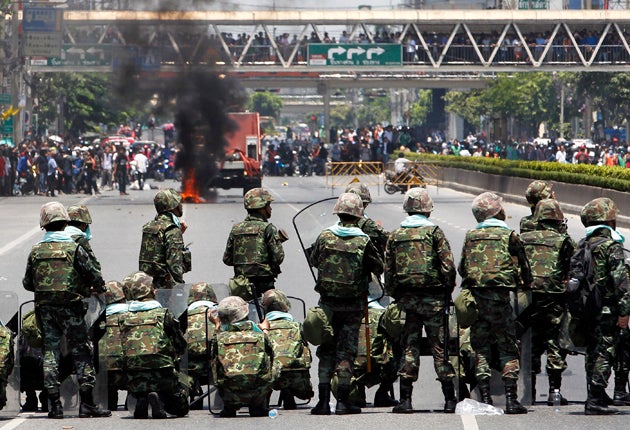Italian photojournalist was killed by high-velocity bullet used by Thailand army
An inquest said it was unknown who fired the bullet and stopped short of outright blaming the military

An Italian photographer killed while covering the Thai military's crackdown on anti-government protesters in Bangkok three years ago was shot by a high-velocity bullet like those issued to soldiers, a judge said today.
The inquest said it was unknown who fired the bullet and stopped short of outright blaming the military. Rights groups have repeatedly called for Thailand's government to hold the powerful army accountable for its part in the violence.
A Bangkok South Criminal Court judge said that the inquest into the death of 48-year-old Fabio Polenghi showed the fatal shot “was fired from the direction of security forces” who were mobilized to quash the demonstration in central Bangkok.
It was likely Polenghi was killed by a bullet from the .223 cartridge which was used with M-16 and HK33 rifles issued to soldiers on the ground that day, the inquest said.
The findings were a stark reminder of a battle fought between the Red Shirt protesters and the government under then-Prime Minister Abhisit Vejjajiva, which led to at least 91 deaths during the two months of demonstrations on the streets of Bangkok in 2010, and of a political divide that remains in the country.
Polenghi was shot as he tried to take pictures of the army's assault on the Red Shirt encampment.
Testimonies from the inquest that began last July showed the bullet went in Polenghi's back and came through his left chest. The judge said the bullet went through his heart, lung and liver, causing excessive bleeding until he died at the hospital on May 19, 2010.
Born in Italy in 1962, Polenghi had been a fashion photographer for many years but was transitioning to news.
Elisabetta Polenghi, 48, his younger sister, was among 13 witnesses who testified in the court case. She was accompanied by her mother and her elder sister to hear the court's order on Wednesday.
“It was positive but it's not the solution,” Elisabetta Polenghi said of the inquest's results. “The solution will come when the responsible will be asked to go out of their duty, away from position that can hurt people.”
The Polenghi case is the eighth inquest initiated by Thai authorities to seek the cause of deaths of those killed in the violence. The court previously ruled that five people were killed by guns used by military personnel, while two inquests were inconclusive on who committed the killings.
Abhisit's government approved the use of live ammunition under limited conditions and deployed sharpshooters and snipers during the demonstration.
The Red Shirt-allied government that succeeded Abhisit's agreed last year to pay compensation to all the victims of violence in order to promote political reconciliation.
Rights groups have repeatedly called for the government to hold the army accountable.
“It's the first step towards achieving justice in this case and we're encouraged that the judges effectively acknowledged that the bullet came from state security forces,” said Shawn Crispin, a Southeast Asia's representative of the non-profit Committee to Protect Journalists. “It's clear that the family of Fabio is going to fight this and will effectively try to establish and hold to account those at the highest ranks of the chains of command that ordered soldiers to shoot that day.”
Thai authorities have a long history of shielding military personnel from prosecution in political bloodsheds in recent decades.
Polenghi's lawyer Karom Polpornklang said Wednesday the inquest will be used in a future court case against Abhisit and his then-deputy Suthep Thaugsuban, who controlled a joint government-military center that ran the operation ending the protests.
“It has to be proven that the orders for the security forces to move in ... came from Mr. Suthep and Mr. Abhisit. They cannot deny their responsibility and cannot be dismissed in this case,” Karom told reporters. “Or else an incident like this will happen again.”
The Department of Special Investigation began a murder investigation of Abhisit and Suthep last year, but charges have not been brought to court.
AP
Join our commenting forum
Join thought-provoking conversations, follow other Independent readers and see their replies
Comments
Bookmark popover
Removed from bookmarks